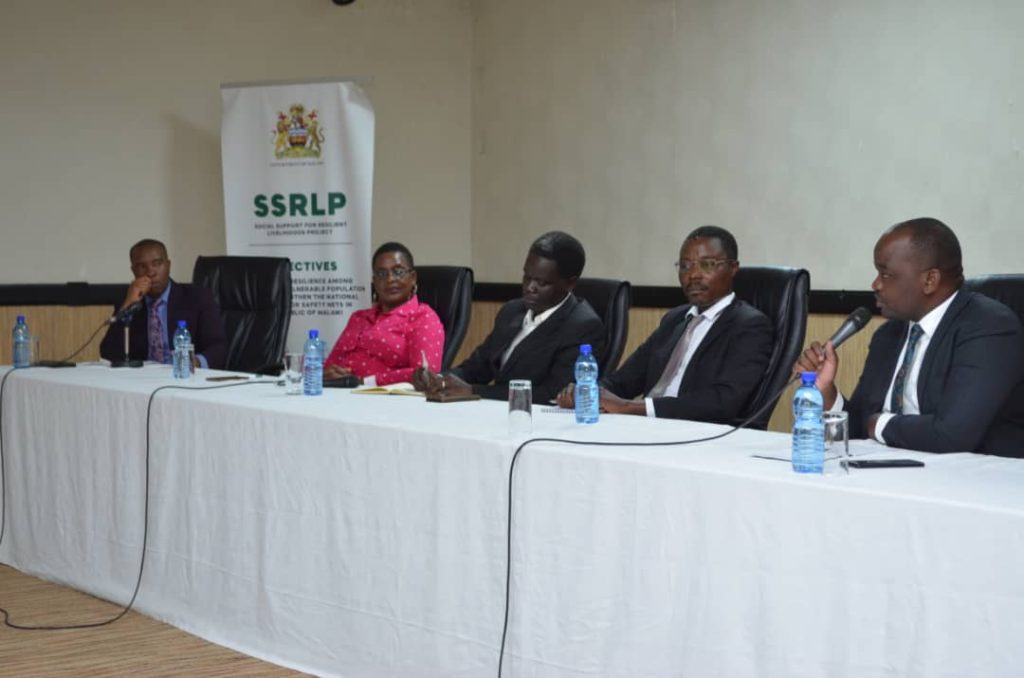Social protection programmes under spotlight
Panelists to a discussion on social protection programmes have underscored the importance of full implementation Universal Beneficiary Registry (UBR) to avoid duplication of beneficiaries in social support programmes as well as coordinate efforts by various players implementing the programmes.
The panelists comprising of government officials and researchers made the observation on Thursday during a panel discussion at Sunbird Mount Soche Hotel in Blantyre after a three-day media training workshop on Social Support Resilient Livelihood Project (SSRLP).

Anderson Gondwe research fellow at Agriculture policy think-tank, Mwapata Institute observed that social protection programs are critical but poor targeting and planning of social safety nets is an issue.
He said: “We did a study based on national data and it did reveal that social protection programmes play a significant role in cushioning households against shocks, and increasing share of households. We, however, noted that people benefit from multiple social safety nets and subsidised coupons whilst others receive nothing.
“This therefore underscores the importance of having the UBR to harmonize and coordinate various efforts from different players taking part in the programme,” said Gondwe.
He said given their importance in helping households cope with the impact of shocks, both social safety nets and input subsidy programmes should be strengthened to address targeting issues which include cases of an increasing share of households benefiting from multiple social safety nets and also receiving both social safety nets and subsidised inputs.
On his part in UBR manager Kondwani Mjumira said the registry which now has 2.7 million Malawians has this far with full registration expected to complete in June stands to harmonise support programs at district and national level and assist in targeting beneficiaries for programmes.
“With this we see a decrease in inclusion and exclusion errors where people who were not supposed to benefit and now left out and those intended to benefit are included.
“We also see less complaints in terms of biases. This is something that is ongoing and once fully implemented we hope it will ensure all these challenges are completely eradicated, he said.
Weighing in, Ministry of Gender, Community Development and Social Welfare chief social welfare officer Anastanzio Matewere admitted that poor targeting has been an issue in the programs but hopes the challenge will be ironed out.
“At first we used committees in the villages to select beneficiaries but this did not give a true reflection of the beneficiaries. The UBR therefore stands to irons out these challenges as beneficiaries are picked by the system in a fair and transparent manner,” he said.
Bessie Msusa, chief economist in the Ministry of Finance and Economic Affairs’ Poverty Reduction and Social Protection Division, said regardless of the minor challenges, social support programs continue to ensure households are supported using all means possible.
“We have the SSRLP which seeks to improve resilience of poor household but also strengthen the platform for safety nets so we want to strengthen the systems as we implement the program. This is where the UBR comes in to ensure there is minimal errors in the system so as to ensure that intended beneficiaries are reached,” she said.
The UBR is a social registry which keeps data for purposes of targeting for social support programmes or research purposes or impact evaluations.
The system has this far been rolled out across Malawi in 28 districts with 2.7 million registered this far.
Government is implementing the Social Cash Transfer Programme (SCTP) targeting 292 000 ultra-poor households, Climate Smart Enhanced Public Works Programme (CSEPWP) targeting 380 000 ultra-poor households, but also the Affordable Inputs Programme (AIP).
Government is currently supporting over 3.8 million Malawians in 847 421 households in all three regions of the country with food items or cash to buy food.





